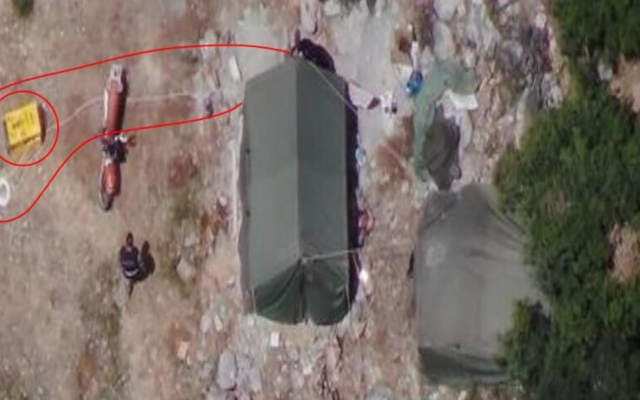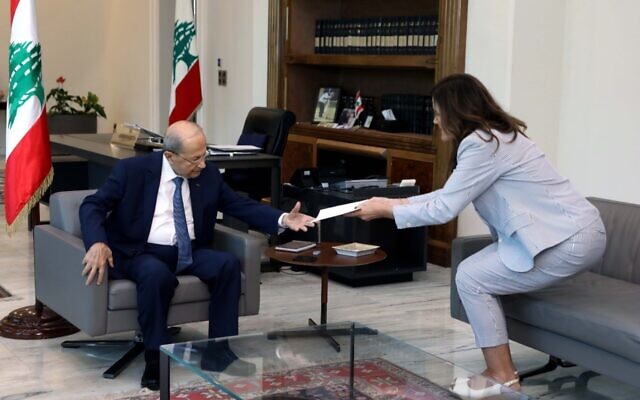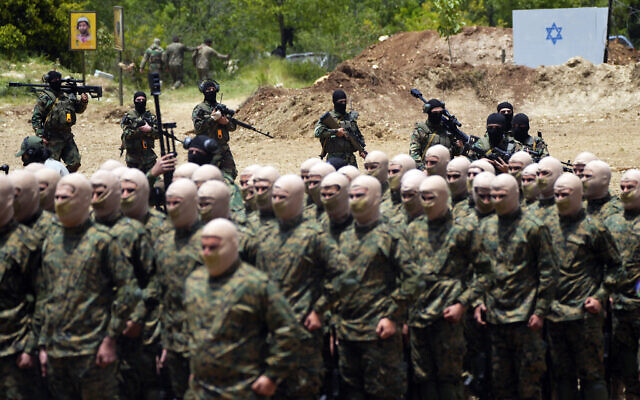Why Hezbollah obsessed with Mount Dov, how Israel has shifted its approach Analysis by The Times of Israel
The Times of Israel has published an article arguing that Defense Minister Gallant equating Lebanon with Hezbollah marked a subtle threat to the country after the terror group set up tents in Israeli territory. Caliber.Az reprints the article.
During a speech on July 5 at a memorial service for soldiers felled in the Second Lebanon War, Defense Minister Yoav Gallant equated Israel Defense Forces activities in Lebanon with operations in Jenin and Gaza.
“Don’t underestimate our strength and determination,” Gallant said. “What you saw two months ago in Gaza and yesterday in Jenin, we’ll be able to do in Lebanon as well. Don’t trigger us because the outcome will be destructive.”
It was a rather unusual statement regarding Lebanon, considering how Israel has spent the past two weeks doing everything to lower tensions surrounding the Hezbollah tents put up inside Israeli territory on the border area of Mount Dov. Until July 5, it seemed the policy was to be cautious in the media to enable as much diplomatic leeway as possible, so the crisis could be solved quietly.
Israel understands that it takes time to solve a crisis with diplomacy. It would be wonderful if a diplomatic effort succeeds, and if it doesn’t, then military action will be more legitimate in the eyes of the international community, the thinking goes.
The UN is working intensely on this front to solve the dispute over Mount Dov.
On July 5, the commander of UNIFIL, the UN’s peacekeeping force in Lebanon, met with Major General Ori Gordin, commander of the IDF Northern Command, to request more time to negotiate with the Lebanese government.
And the fact that Hezbollah agreed to remove one of the tents is a sign of its interest to solve the crisis; at the very least, that’s what the UN is trying to tell Israel.

Jerusalem’s efforts to avoid a conflict with Hezbollah were laid out by the press monitoring group Middle East Monitor, citing the Turkish Anadolu News Agency. It turns out that the mediator between Hezbollah and Israel, by way of the Lebanese government, is the US Ambassador to Lebanon, Dorothy Shea.
Shea explained to Lebanese Prime Minister Najib Mikati that Israel is not interested in a “military conflict” over the tents. This was also confirmed in the Hezbollah-aligned daily Al Akhbar, quoting Hezbollah members who said that talks are being held with a number of international bodies.

“The more appeasing official statements are, and the more Hezbollah lessens its presence in the area, the easier it will be to solve this crisis quietly,” Shea told the Lebanese.
What’s interesting about the ambassador’s remarks is their ambiguity. The term “military conflict” was clearly stated, but it’s not clear whom Israel is not interested in a conflict with – Lebanon or Hezbollah? This ambiguity was probably not an accident, and it resonated with Gallant’s remarks on July 5.
Israel is still suffering from the trauma of the Second Lebanon War in which it was handicapped — particularly by the Bush Administration — to exclusively fight Hezbollah without damaging the Lebanese state. This handicap is generally considered to have caused Israel to take precautions that extended the duration of the war.
Therefore, the sharp Israeli message on July 5 was much clearer: In the next conflict, if and when it breaks out, Lebanon and the Lebanese government will be held responsible and will also be hurt alongside Hezbollah.

In Israeli jargon, this is referred to as the “Dahieh Doctrine,” named after the predominantly Shiite quarter in southern Beirut in which Hezbollah headquarters were located in 2006. The dozens of buildings comprising this complex were wiped out by Israeli airstrikes during the final days of the Second Lebanon War. Israel made sure to publish photos of the wreckage, which Hezbollah tried to hide, but not always successfully.
This doctrine was publicized in an in-depth interview given to the Yedioth Ahronoth daily by then head of the Northern Command Gadi Eisenkot, who later became IDF chief of staff. Israel has not stopped talking about the doctrine ever since. This ties directly with Gallant’s statements that deliberately referred to Lebanon, and not just Hezbollah.
Despite the defence minister’s aggressive remarks, which were likely approved by Prime Minister Benjamin Netanyahu, Hezbollah removed one of the tents at Mount Dov. Perhaps this was an attempt to mitigate the chances of a military conflict, as Hezbollah already got its PR victory in Lebanon.
If that doesn’t happen, some in Israel see a limited conflict over the tents as an opportunity to redefine the rules. “Hezbollah of today is different from the Hezbollah we used to know,” a senior security official told Zman Yisrael, The Times of Israel’s Hebrew-language sister site. “[Hezbollah] is bigger, more daring, and more spread out and armed across the border. This is an opportunity to change the balance of power Hezbollah has recently created.”
It is not by chance that Hezbollah chose to once again operate at Mount Dov. Anytime the organization finds itself in trouble, it goes there. The current problem is the barrier Israel is building along the Blue Line, the internationally recognized border between the two countries. A wired fence is being replaced with a tall cement barrier with advanced surveillance systems.
Just like the barrier in Gaza that neutralized Hamas’s strategic tunnels, Hezbollah understands that the discovery and neutralization of its tunnels will make its war plans of occupying parts of the Israeli Galilee far more difficult. Mount Dov is precisely the place in which Hezbollah can operate without paying an international or local price.

This area has been disputed since 1916 between Syria and Lebanon. The Sykes-Picot Agreement that drew the borders of the middle was not precise enough because of the width of the pencil, and therefore, until today, there are those who claim the area belongs to Lebanon, and not Syria.
This dispute allows Hezbollah to operate there. The organization is depicted to the international community as fighting to liberate Lebanese territory. Within Lebanon, this allows it to strengthen its standing as the protector of the interests of Lebanon and all its citizens. This was true during Hezbollah’s kidnapping and killing of three Israeli soldiers at Mount Dov in October 2000, immediately after the Israeli withdrawal from South Lebanon, and also after the assassination of the son of Imad Mughinyeh in Syria.
Hezbollah sees Mount Dov as its diplomatic and operational comfort zone. Israel is seeking to undermine this idea, and it won’t take months, regardless of whether the solution comes by diplomacy or by force.








